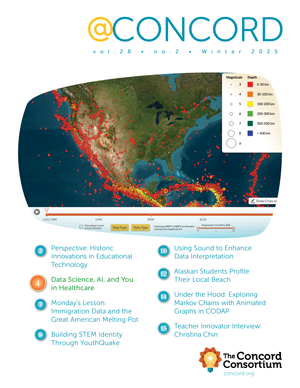News at Concord Consortium
Geological Construction of Rock Arrangements from Tectonics
Earth science classes typically present plate tectonics and the rock cycle as separate, unrelated concepts. A new project is designed to change that. With Pennsylvania State University, we are developing and researching an innovative new multi-scale simulation and related curricula to bridge the tectonic system and the rock cycle and to engage Earth science students in grades 6-9 in authentic scientific practices. Using the Tectonic Rock Explorer simulation, students investigate the evolution of rock sequences by changing tectonic conditions and watching rock layers form. Students will be able to predict what types of rocks are generated under specific tectonic situations and infer what causal mechanisms can lead to rock arrangements found in real-world examples. Project research will shed light on the role uncertainty plays in reconciling simulation-based evidence with real-world phenomena when students build scientific arguments.
Fostering Deep Learning, Identity, and Agency
Minoritized students often do not see themselves as belonging in science or even see science as relevant to their lives, and minoritized groups continue to be underrepresented in science careers. The Concord Consortium, Rutgers University, and the University of North Carolina Greensboro aim to deepen our understanding of how to support minoritized youth in three interlinked aspects critical for success in school science and beyond: authoring science-linked identities, negotiating epistemologies, and learning core science ideas and practices. We are collaborating with teachers, community members, and seventh grade students in New Brunswick, New Jersey, to develop an instructional unit that engages students in addressing a local health-related problem they identify. Using community-based ethnographies and powerful technologies, students will explore and explain the underlying biological and environmental mechanisms and develop possible solutions that can be implemented in the community.
Enhancing the Teacher-Curriculum Relationship in Problem-Based Mathematics Classrooms
With Michigan State University, we designed a digital platform for middle school students to collaborate when solving mathematical problems. A new project now focuses on the role of teachers as learners by enabling teachers to plan, enact curriculum, and reflect on student learning in networks within and across schools. Teachers will work in a professional learning community to discuss problem-based curriculum materials and classroom artifacts and to share resources. Project research will study how the use of teaching resources within a digital teacher collaborative environment can strengthen the teacher-curriculum relationship and explore how the cyclical and dynamic use of teaching resources can foster teacher understanding and promote student learning.
Empowering Informal Educators to Prepare Future Generations in Wireless Radio Communications
BSCS Science Learning, the Concord Consortium, Georgia Tech, the Children’s Creativity Museum (CCM), and museums from the National Informal STEM Education Network (NISE) are launching a new project to develop an innovative mobile suite of resources to support public understanding of modern radio and radio frequency communications. Resources include digital apps, a craft-based radio toolkit, and activity guides for youth in a range of informal learning settings, as well as mobile online professional learning for educators to expand new knowledge and practices in facilitating youth and public experiences. Three NISE Network museums (CCM, Sciencenter, and the Museum of Life and Science) will disseminate the mobile suite of resources and technology innovations. Project research will identify gaps in public understanding and perceptions of radio frequency communications and examine changes to interest, self-efficacy, content knowledge, and STEM-related career interest for youth.
